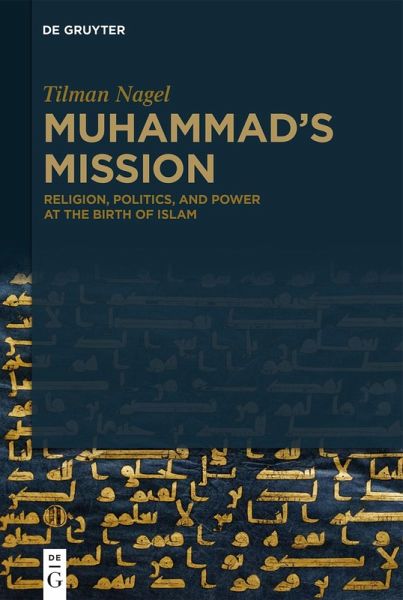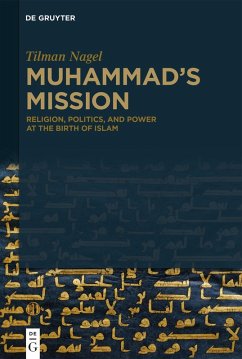
Muhammad's Mission (eBook, ePUB)
Religion, Politics, and Power at the Birth of Islam
Übersetzer: Spoerl, Joseph
Versandkostenfrei!
Sofort per Download lieferbar
52,95 €
inkl. MwSt.
Weitere Ausgaben:

PAYBACK Punkte
26 °P sammeln!
Combining vast erudition with a refusal to bow before the political pressures of the day, Muhammad's Mission: Religion, Politics, and Power at the Birth of Islam by Professor Tilman Nagel, one of the world's leading authorities on Islam, is an introduction to three inseparable topics: the life of Muhammad (570-632 CE), the composition of the Koran, and the birth of Islam. While accessible to a general audience, it will also be of great interest to specialists, since it is the first English translation of Professor Nagel's attempt to summarize a lifetime of research on these topics. The Introdu...
Combining vast erudition with a refusal to bow before the political pressures of the day, Muhammad's Mission: Religion, Politics, and Power at the Birth of Islam by Professor Tilman Nagel, one of the world's leading authorities on Islam, is an introduction to three inseparable topics: the life of Muhammad (570-632 CE), the composition of the Koran, and the birth of Islam. While accessible to a general audience, it will also be of great interest to specialists, since it is the first English translation of Professor Nagel's attempt to summarize a lifetime of research on these topics. The Introduction, Chapters 1-2, and Appendix 1 provide essential historical background on the Arab tribal system and Muhammad's position within that system; the political situation in pre-Islamic Arabia; the history of Mecca; and pre-Islamic Arabian religions. Chapters 3-5 cover the beginnings of the revelations that Muhammad claimed to be receiving from Allah, paying special attention to the influence on Muhammad of the hanifs, a group of pre-Islamic pagan monotheists attested in the earliest Islamic sources. The hanifs claimed to trace their religion back to the putative original monotheism of Abraham, from which they claimed Jews and Christians had deviated by, among other things, abandoning animal sacrifice. Chapter 6 explains how Muhammad's religious message included a thinly-veiled claim to have the right to political power over Mecca, a claim that exacerbated tensions with his own clan and led eventually to his expulsion from Mecca, as recounted in Chapter 7. Chapters 8-10 describe the impact of the hijra on the evolution of Islam. Seeing himself as the true heir to Abraham and the prophets who followed him, Muhammad would demand allegiance from Jews and Christians, as recounted in Sura 2 and other Medinan suras. He would initiate a war against Mecca, not in self-defense, but in order to gain control over the Kaaba, the central hanif shrine and the new qibla or direction of prayer for the Muslims. The Muslim victory at the Battle of Badr in 624 would help to shape a new ideal of a militarized religiosity in which those who waged war under Muhammad's command would attain the rank of "true believers," while those converts who refused to make hijra and to fight for Muhammad were relegated to the lower rank of "mere Muslims," as Suras 8 and 49 make clear. Muhammad's war against Mecca alienated many of his Medinan followers, the ansar. The refusal of the Jews to convert to Islam, combined with the close connection of the Jews to the ansar, led Muhammad to make war on the Jews as well as the Meccans. The surrender of Mecca in 630 (Chapter 11) did not lead to the end of war, for the aggressiveness and military success of Muhammad's movement had made it attractive to a slew of new converts whose desire for booty had to be placated. Sura 9, promulgated near the end of Muhammad's life, served as a broad declaration of war against polytheists, Jews, and Christians. Chapter 12 describes the evolution of Islam late in Muhammad's life into a "religious warriors' movement" that sought to extend the rule of Islam over the entire inhabited world. Chapter 13 covers the final pilgrimage and death of Muhammad, while Chapters 14-20 describe the development of Islamic dogma surrounding the figure of Muhammad and its implications for politics in the Islamic world and interfaith relations with non-Muslims up till the present day. The book concludes with appendices in which Nagel summarizes the state of scholarship regarding the life of Muhammad (Appendix 2) and the tensions between competing varieties of Muslim recollection of Muhammad (Appendix 3). Muhammad's Mission: Religion, Politics, and Power at the Birth of Islam is an erudite and authoritative guide to events of world-historical importance by a scholar who has spent a lifetime mastering the primary sources documenting the birth of Islam.
Dieser Download kann aus rechtlichen Gründen nur mit Rechnungsadresse in A, B, BG, CY, CZ, D, DK, EW, E, FIN, F, GR, HR, H, IRL, I, LT, L, LR, M, NL, PL, P, R, S, SLO, SK ausgeliefert werden.













